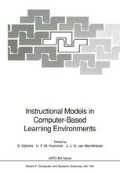Abstract
In an automated instructional system, learner control suggests that there is some basis on which the system may recommend and the learner may select relevant and appropriate instructional elements and that the system has the capability to respond to learner requirements by customizing the delivery of each element. We report research into these two areas of sequencing and delivery. We first describe a knowledge representation model that expresses the interrelations among instructional elements. A domain knowledge base created using this model, available through all phases of the instructional development cycle, provides information to the system and the learner for identifying which elements are related in some way to the just presented element and, more importantly, the nature of the relation so that an informed sequencing decision may be made. We then describe transaction shells, reusable instructional components, which when instantiated with content from the domain knowledge base deliver instruction to the learner. This instruction is configurable both by the author and dynamically by the system to take into account knowledge about the learner, including aptitude, goals, and previous instruction. The automated system, by configuring a shell dynamically, adjusts an instructional element to meet expressed or derived learner requirements. These two elements combine to provide a foundation for implementing learner control in an automated instructional system.
Access this chapter
Tax calculation will be finalised at checkout
Purchases are for personal use only
Preview
Unable to display preview. Download preview PDF.
References
Abiteboul, S., Hull, R.: IFO: A formal semantic database model. ACM Transactions on Database Systems. 12, (4), 525–565 (1987)
Agha, G.A.: ACTORS: A model of concurrent computation in distributed systems. Cambridge, MA: MIT Press 1987
Bobrow, D.G., Winograd, T.: An overview of KRL, A knowledge representation language. Cognitive Science. 1, (1), 3–46 (1987)
Brachman, R.J., Levesque, H.J.: Readings in knowledge representation. San Mateo, CA: Morgan Kaufmann 1985
Chen, P.P.: The entity-relationship model: Toward a unified view of data. ACM Transactions on Database Systems. 1, (1), 9–36 (1976)
Gagné, R.M.: The conditions of learning. 4th ed. New York: CBS College Publishing 1976
Goldberg, A., Robson, D.: Smalltalk-80: The language and its implementation. Reading, MA: Addison-Wesley 1976
Hammer, M., McLeod, D.: Database description with SDM: A semantic database model. ACM Transactions on Database Systems. 6, (3), 351–386 (1981)
Hull, R., King, R.: Semantic database modeling: Survey, applications, and research issues. ACM Computing Surveys. 19, (3), 201–260 (1987)
Jones, M.K., Li, Z., Merrill, MD.: Domain knowledge representation for instructional analysis. Educational Technology. 30, (10), 7–32 (1990)
Merrill, M.D.: Component display theory. In: Instructional design theories and models. (C.M. Reigeluth, ed.). pp. 279–333. Hillsdale, NJ: Lawrence Erlbaum 1987
Minsky, M.: A framework for representing knowledge. (originally printed in 1974 ) In: Mind design. (J. Haugland, ed.). pp. 95–128. Cambridge MA: MIT Press, 1981
Peckham, J., Maryanski, F.: Semantic data models. ACM Computing Surveys. 20, (3), 153–189 (1987)
Quillian, M.R.: Word concepts: A theory and simulation of some basic semantic capabilities. Behavioral Science, 12, 410–430 (1967)
Smith, J.M., Smith, D.C.P.: Database abstractions: Aggregation and generalization. ACM Transactions on Database Systems. 2, (2), 105–133 (1977)
Su, S.Y.W.: SAM*: A semantic association model for corporate and scientific-statistical databases. Information Sciences. 29, 151–199 (1977)
Author information
Authors and Affiliations
Editor information
Editors and Affiliations
Rights and permissions
Copyright information
© 1992 Springer-Verlag Berlin Heidelberg
About this paper
Cite this paper
Jones, M.K., Li, Z., Merrill, M.D. (1992). Implementing learner control in an automated instructional system. In: Dijkstra, S., Krammer, H.P.M., van Merriënboer, J.J.G. (eds) Instructional Models in Computer-Based Learning Environments. NATO ASI Series, vol 104. Springer, Berlin, Heidelberg. https://doi.org/10.1007/978-3-662-02840-7_29
Download citation
DOI: https://doi.org/10.1007/978-3-662-02840-7_29
Publisher Name: Springer, Berlin, Heidelberg
Print ISBN: 978-3-642-08148-4
Online ISBN: 978-3-662-02840-7
eBook Packages: Springer Book Archive

